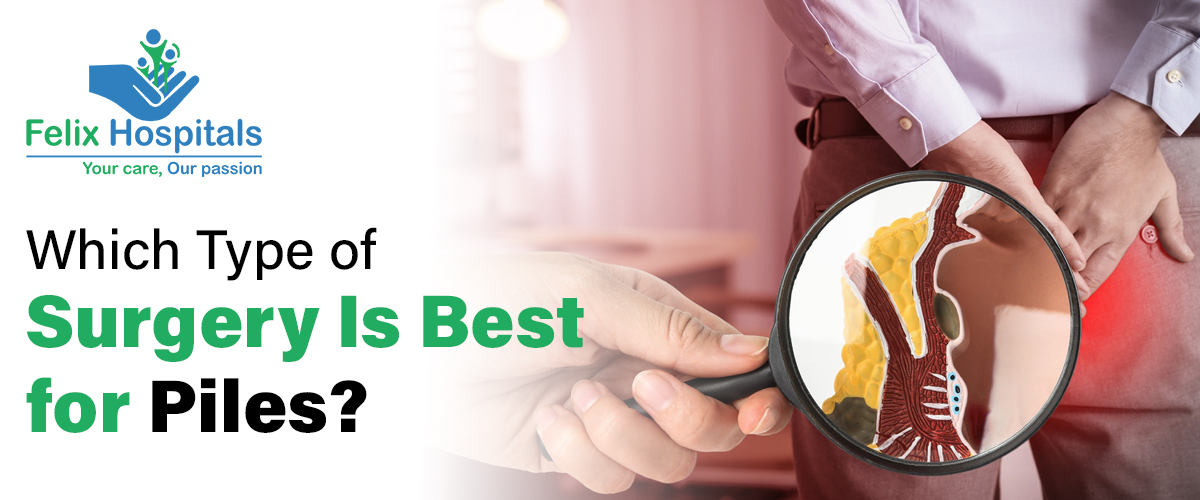
Subscribe to our

Many cases of piles can be treated with lifestyle changes and non-surgical methods, some may require surgical intervention. But which type of surgery is best? Let's explore the options.
Hemorrhoids, commonly known as piles, are swollen and inflamed veins in the rectum and anus that can cause discomfort, pain, itching, and bleeding. While many cases can be managed with conservative treatments such as dietary changes, medications, and lifestyle modifications, some severe or persistent cases may require surgical intervention. Choosing the right type of surgery depends on various factors including the severity of the hemorrhoids, patient preference, and the surgeon's recommendation.
Felix Hospital is always available to assist you. Contact us at +91 9667064100.
Hemorrhoids can develop internally or externally:
Surgery for hemorrhoids is typically considered when:
1-Hemorrhoidectomy:
2-Minimally Invasive Procedures:
Rubber Band Ligation (RBL):
Sclerotherapy:
Coagulation Techniques (Infrared Coagulation, Laser Coagulation):
3-Stapled Hemorrhoidopexy (Procedure for Prolapse and Hemorrhoids - PPH):
The best type of surgery for hemorrhoids depends on several factors, including:
Dr. Ritesh Agarwal, with 15 years of experience, excels in general, laparoscopic, laser, vascular, and proctology surgeries. He is an expert in various open and laparoscopic surgeries, including lap cholecystectomy (gall bladder stone removal), hernia repair, laparotomy, and non-cancerous breast surgeries (breast lump, pain, nipple discharge). Additionally, Dr. Ritesh is a trained laser surgeon, specializing in proctology procedures such as piles, fissure, fistula, pilonidal sinus, varicose veins, and circumcision.
Book an Appointment at helpdesk@felixhospital.com. Or call at 9667064100.
Hemorrhoids are a common problem that can cause significant discomfort and pain. While many cases can be managed with conservative treatments, some require surgical intervention for relief. The choice of surgery depends on the severity of the hemorrhoids, patient preference, and the surgeon's recommendation. From traditional hemorrhoidectomy to minimally invasive procedures like rubber band ligation and coagulation techniques, there are several options available to treat hemorrhoids effectively.
If you're suffering from hemorrhoids that haven't responded to other treatments, consult with a qualified healthcare provider to discuss your options. They can help determine the best treatment plan for your specific condition and ensure you receive the care you need to improve your quality of life.
For more information and personalized advice, schedule a consultation with a healthcare provider who specializes in hemorrhoid treatment.
1-Which Type of Surgery Is Best for Piles?
Ans. Here are the main types of surgery for piles (hemorrhoids):
2-What is the reason for piles?
Ans. Piles develop due to increased pressure in the lower rectum, causing veins to swell. Common causes include straining during bowel movements, chronic constipation or diarrhea, prolonged sitting, low-fiber diet, obesity, pregnancy, aging, and genetic factors. These issues can lead to inflammation and discomfort in the anal area, resulting in the formation of hemorrhoids.
3-How to avoid piles?
Ans. To prevent piles, consider the following tips:
4-Can piles be cured?
Ans. Yes, piles can be effectively treated and managed. Mild cases often respond well to home treatments and lifestyle changes, while more severe cases may require medical or surgical interventions.
5-What should I do if I have piles?
Ans. If you suspect you have piles:
6-What is the first stage of piles?
Ans. The first stage of piles, also known as Grade 1 hemorrhoids, involves swollen veins that do not prolapse (protrude) outside the anus. Symptoms may include itching, discomfort, and occasional bleeding during bowel movements. Early-stage piles can often be managed with dietary changes, increased water intake, and over-the-counter treatments.